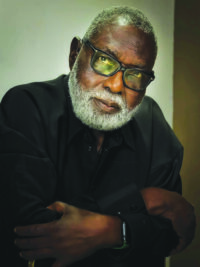Do not narrate your trauma to prove your humanity, argues LINUS OKORIE
Many years ago, I was at a speaking engagement where someone from the audience was spontaneously called to speak on a subject. He got on the podium, and he start lamenting on how he was unprepared for the topic. The room went quiet, not out of awe, but discomfort. It was not the vulnerability that was unsettling. It was the lack of boundaries. What should have been a moment of connection became a moment of confusion. Why did he start with such great lamentation? What was his motive? Was he seeking pity or sympathy? No one was out to judge him or punish his poor delivery. That encounter stayed with me. It reminded me that while people are drawn to sincerity, they are not always prepared to hold your wounds, especially when you have not yet held them yourself.
Is that not similar to what is playing in today’s world of content creation, everyone wants to share something in the name of vulnerability? Some hope it goes viral, turning them into the next social media influencer. To attract large following and preoccupy people’s minds, we’re told to “own our story,” “be authentic,” and “share our truth.” And in a world filled with filters and polished facades, it makes sense. People are tired of perfection. They want the messy, the honest, the behind-the-scenes. But here’s the tension: where does authenticity end and oversharing begin? Where’s the line between showing your scars and bleeding in public for likes?
We’ve created a culture that glorifies vulnerability. Yes, your voice is your brand. Yes, your story is your bridge. But you do not have to strip yourself bare to prove you’re real. You do not have to narrate every painful detail to be seen as honest. There’s wisdom in restraint. There’s power in privacy. This is especially true for leaders. People may admire your strength, but they trust your stability. And that trust is often built in what you choose not to say. So let us talk about what it means to be authentic without sacrificing your dignity to the demands of visibility.
Open your feed and you’ll see it. Heart-wrenching confessions. Raw videos of breakdowns. Grief turned into captions. Struggles packaged for public sympathy. We’ve made it easy to confuse openness with emotional nudity. But not everyone sharing is doing it from a place of healing. And not everyone watching is capable of holding what’s being shared.
Do you know the worst part? It works. Posts that pull at heartstrings go viral. The algorithm rewards pain. But at what cost? Your peace? Your process? Your privacy? Are these really worth losing? Stella Young, the late disability rights activist, coined the term inspiration porn to describe how society often consumes stories of hardship, especially from disabled people, just to feel better about themselves. The storyteller becomes a tool for someone else’s motivation. Their humanity gets reduced to a headline. It’s happening again, only this time, it’s cloaked in “vulnerability.”
Let’s be clear that being real does not mean being raw at all times. You can be authentic and still have boundaries. Telling your story does not mean you owe the world every chapter. The truth can be told without full exposure. You can inspire others without packaging your pain for performance or applause. Vulnerability is about honesty. Before you share, pause and ask yourself: Is this for me or them? Am I sharing this because it’s processed or because I’m hoping someone else will help me process it? Have I healed enough to speak from strength, or am I still in the middle of it, needing support instead of feedback?
Sometimes people say, “I’m just being real,” but what they’re really doing is outsourcing their healing. Hoping the crowd will help them make sense of the mess. Hoping strangers will affirm their pain. But healing is not a group project and social media is not a therapist’s couch. Constantly turning your struggles into content comes at a cost. It distorts your process. When your pain becomes your platform, it’s hard to let go of it. You begin to define yourself by your struggle. Instead of moving forward, you’re stuck in an endless cycle of revisiting the same story because it keeps the engagement coming.
It exposes you to the wrong audience. Not everyone scrolling has the emotional maturity to hold your truth. Some people will not get it. Others will mock it. A few will even weaponize it. It creates performance fatigue. You’re always thinking about how to shape your suffering into a shareable post. You start managing your image more than your emotions. Your timeline becomes your timeline for people like you who are seeking sympathetic resonance, and that’s dangerous for your brand.
And here’s the kicker: when the applause fades, you might start believing your pain no longer matters. That your worth is tied to how deeply you’ve suffered, how publicly you’ve shared it, and how loudly people clapped. That’s not authenticity. That’s entrapment.
Real vulnerability is not about how much you share. It’s about why you share. It looks like speaking from a scar, not an open wound. It means you’ve processed the experience, pulled the lessons from it, and can now offer a clearer, more grounded perspective to others. It means choosing intentionality over impulse. You’re not posting while emotions are raw or wounds are fresh. You’ve taken a step back, sat with the pain, and now you’re choosing to share with clarity.
It also means you share with the goal of helping, not just venting. The intent behind the message is service, not sympathy. You’re saying, “Here’s what I went through, and here’s what I learned,” instead of “Here’s my mess—please affirm me.” And it means knowing what to keep sacred. Not everything you go through is for public consumption. Not every struggle is meant to be turned into a teachable moment. Some stories are still unfolding. Some are not ready. And some are just for you, or for trusted ears behind closed doors. One of the most powerful things you can say is, “I’ve been there, and here’s what helped me.” That comes from healing. That’s where real power lives.
You are not your pain. You are not your worst day. Your brand is built on your truth, not your trauma. On your lessons, not your losses. On your growth, not your grief. Share your story from a place of strength. The most magnetic brands are not the ones constantly bleeding. They’re the ones that show up whole. The ones that say, “Here’s what I’ve been through — and here’s who I’ve become.” That’s what people remember. That’s what earns respect.
So, no — you do not owe the world your wounds. You do not have to bleed in public to be seen as real. You can be authentic and still have boundaries. Do not narrate your trauma to prove your humanity. You are not content.
Remember: realness is showing up with honesty and wisdom. Tell your story when you are healed. The one that uplifts. The one that reminds someone else: “You can make it through too.” That’s real authenticity. And it’s more powerful than any viral post.
Okorie MFR is a leadership development expert spanning 30 years in the research, teaching and coaching of leadership in Africa and across the world. He is the CEO of the GOTNI Leadership Centre.

















Leave a comment